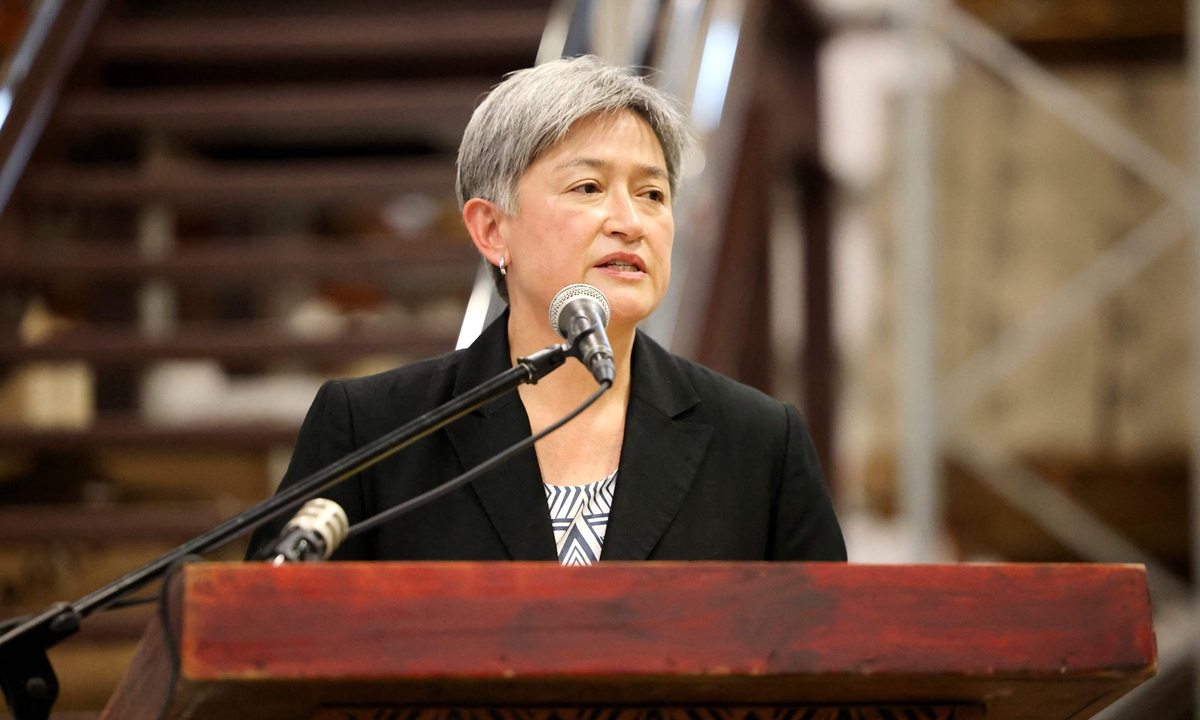Australia’s Foreign Minister is scheduled to visit China from Tuesday to Wednesday, with analysts viewing it as an “ice-breaking” diplomatic activity, as this is the first time a ministerial-level senior official from Canberra will visit China since 2019.
They noted that China appreciates Australia’s attitude to correct the mistakes made by its former government and willingness to bring ties back on track as soon as possible, but also warned that the US and anti-China forces within Australia may interrupt the recovery of ties in future.
Foreign Ministry Spokesperson Mao Ning announced on Monday that “at the invitation of Member of the Political Bureau of the CPC Central Committee, State Councilor and Foreign Minister Wang Yi, Australian Minister for Foreign Affairs Penny Wong will pay a visit to China on December 20 and 21.”
After the meeting between top leaders of the two countries in Bali, Indonesia on the sideline of the G20 Summit last month, China and Australia are now continuing to make joint efforts to fix bilateral relations, which were seriously damaged by Scott Morrison’s administration, which held extreme and unreasonable hostility against China and blindly sacrificed Australia’s interests to serve US strategy.
The current Labor administration led by Prime Minister Anthony Albanese has shown a sincere attitude to correcting the mistakes made by the former government. It seems like Canberra really wants to bring ties back on track and have pragmatic cooperation with China to bring concrete benefits to the people of the two countries. This is very laudable in China, said Chinese experts.
Australian media outlets are paying close attention to Wong’s visit. According to ABC News, the last time an Australian minister travelled to China was when then-trade minister Simon Birmingham visited in November 2019.
According to ABC, Birmingham said the Coalition welcomed the news and wished Minister Wong well. “We both have much to gain from supporting a stable, prosperous and open Indo-Pacific, in which the sovereignty of nations is respected and the international rules-based order upheld,” he said in a statement.
The visit is a major step in the improvement of China-Australia relations, showing the proactive action taken by both sides to try to bring bilateral relations back to the normal track, Chen Hong, director of the Australian Studies Center at East China Normal University, told the Global Times on Monday
As Wong’s visit coincides with the 50th anniversary of the establishment of bilateral diplomatic relations, Chen said that standing at a new starting point, Wong’s visit gives observers from both sides expectations of an “all-around recovery” in future China-Australian relations.
Chen said China-Australia relations experienced a nightmare in the past six years under the Morrison administration, who brought ties to the brink of collapse through his reckless sabotage.
Zhou Fangyin, a research fellow at the Guangdong Institute for International Strategies, told the Global Times on Monday, “This is an ice-breaking visit.” Before this visit, many ministerial-level officials from the Australian side had expressed a wish to visit China, but they were all refused as “we found they want to keep opposing China in the fields of politics and security but keep economy and trade unaffected and pay no price.”
“But now, we found Australia’s attitude has further changed, so we can see the visit is at Wang’s invitation, which shows China’s recognition for Australia’s laudable attitude, Zhou noted.
China appreciated the proactivity of the Australian new government as it rectifies its predecessor’s irrational diplomatic methods, by adopting measures suited to Australia’s long-term interests and the common interests of the two countries, said Chen.
“By doing so, the new government has also responded to the long-existing rational domestic voices from some politicians, business people and intellectuals who called for an end to the further deterioration in China-Australia relations,” Chen said.
But in the future, China and Australia still need to be careful of the impact from the US and anti-China forces within Australia to disrupt the recovery of the ties, said experts, adding that China will also be realistic and pragmatic in respecting Australia’s interests and concerns, as long as Australia can sincerely respect China’s core interests such as the Taiwan question.
Chen said the recovery of bilateral ties will not be that easy, as “it is always easier to break than to make” and the two sides need to solve many problems, including those related to the economy and trade, and to what extent Canberra can withstand the pressure from Washington also remains a question.
“We hope Australia can show flexible, pragmatic and resilient approaches in the future process of fixing ties, and China will also be realistic and pragmatic as we understand that it’s impossible to solve all divergences between the two sides, and we cannot change the basic fact that Australia is a US ally,” Chen noted.
Zhou echoed the view, saying that the worsening of China-Australia ties doesn’t serve the interests of the two sides, and the US always wants to push Australia to stand on the frontline to confront China and accuse it of “coercion against Australia.” China will prove the US is wrong.
On the issue of the South Pacific islands countries, China will maintain cooperation with the regional countries but will also respect Australia’s legitimate and reasonable concerns, Zhou said, stressing that Australia can learn from New Zealand’s experience on how to handle its alliance with the US and keep win-win cooperation with China at the same time.













